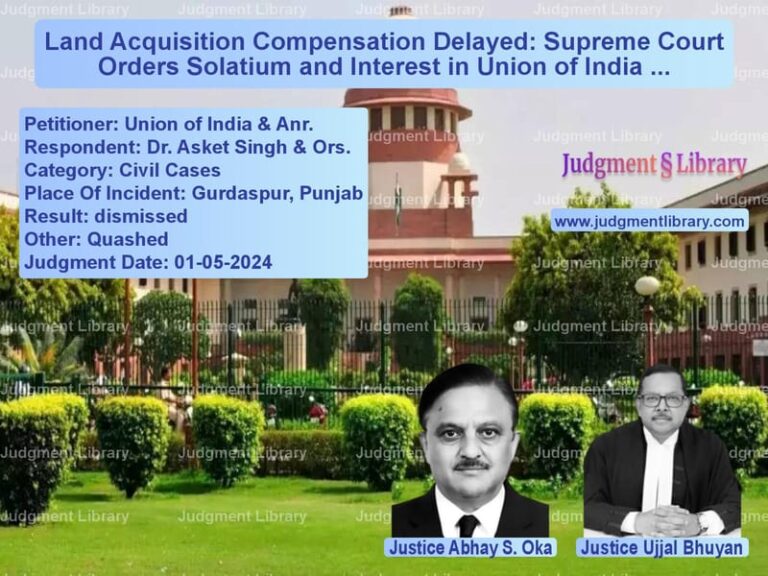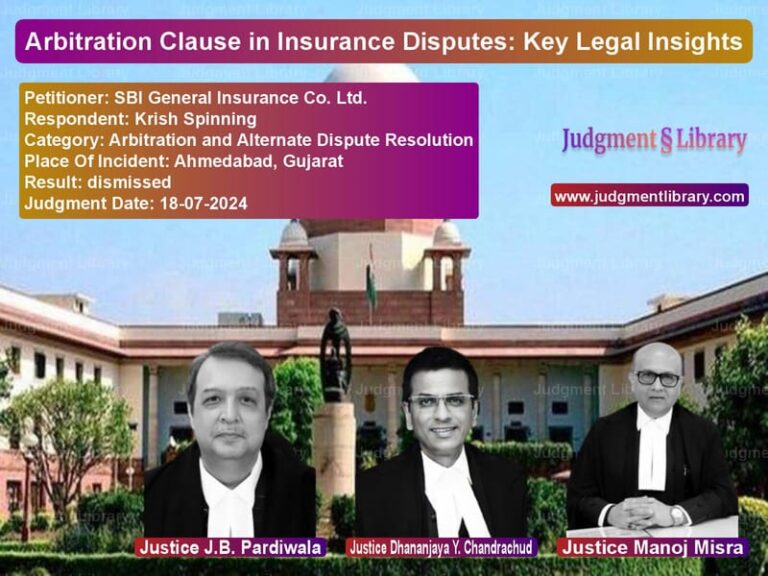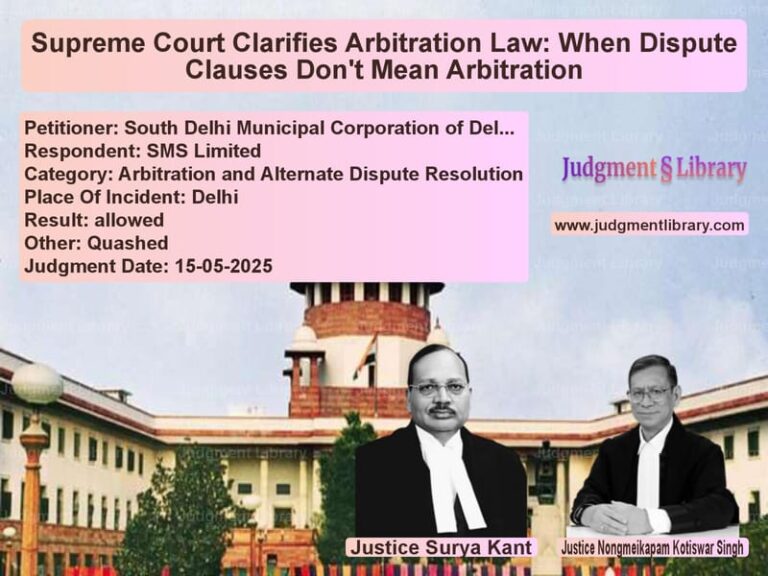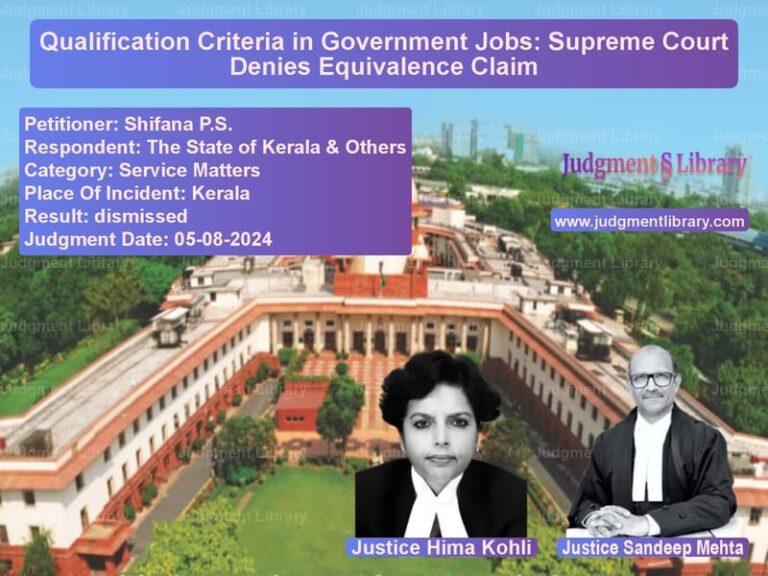Supreme Court Orders Regularization of Railway Clerks After 25 Years of Service
The Supreme Court of India has ruled in favor of a group of temporary railway employees, directing the Union of India to regularize their services. The case involved Vinod Kumar and others, who were initially hired on temporary contracts but continued working for over 25 years without permanent status. The Court found that their employment was no longer temporary in nature and that denying them regularization violated principles of fairness and equity.
Background of the Case
The appellants, Vinod Kumar and others, were appointed as Accounts Clerks in the Indian Railways in 1992 under an ex-cadre scheme. Their selection process included written examinations and interviews, similar to permanent employees. Despite working continuously for over two decades, their employment remained classified as temporary.
In 1999, they requested regularization, which was denied by the Divisional Railway Manager. Subsequently, they approached the Central Administrative Tribunal (CAT), Allahabad Bench, which dismissed their plea on November 21, 2001. The Tribunal ruled that since their employment was under a specific scheme, they were not entitled to regularization. The Allahabad High Court upheld this decision in 2016, leading them to file an appeal before the Supreme Court.
Petitioners’ Arguments
The appellants contended that:
- They had been performing the same duties as permanent employees for over 25 years.
- Their appointment process was similar to that of regular employees, involving written tests and interviews.
- They were promoted through a Departmental Promotion Committee, indicating that their employment was more than just temporary.
- The High Court misapplied the judgment in Secretary, State of Karnataka v. Umadevi (2006), which held that casual workers do not have a right to regularization unless employed in sanctioned posts.
Union of India’s Arguments
The respondents argued that:
- The appellants were engaged under a scheme that did not provide for regularization.
- Appointments made under temporary schemes cannot confer rights akin to permanent employees.
- The judgment in Umadevi applies to their case, preventing their absorption into permanent posts.
- Granting them regularization would set a precedent affecting other temporary employees.
Supreme Court’s Ruling
The Supreme Court analyzed whether the appellants’ employment had evolved beyond its initial temporary nature. The Bench, comprising Justices Vikram Nath and K.V. Viswanathan, ruled that:
- Long-term continuous employment, coupled with a formal selection process and departmental promotions, cannot be treated as temporary.
- The Umadevi judgment distinguishes between illegal and irregular appointments. The appellants’ appointments were not illegal since they were made through a proper selection process.
- Their service conditions and the absence of any reaffirmation of their temporary status over the years justify their regularization.
- Procedural technicalities at the time of appointment cannot be used to deny substantive employment rights gained over time.
The Court also cited Paragraph 53 of the Umadevi judgment, which allows for the regularization of employees who have worked for over ten years in sanctioned posts, provided their appointments were not made through backdoor entries.
Key Directives of the Supreme Court
The Court issued the following directives:
- The judgment of the Allahabad High Court is set aside.
- The appellants are entitled to be considered for regularization.
- The Union of India is directed to complete the process of regularization within three months from the date of service of the judgment.
- No costs were awarded in the case.
Impact and Significance of the Judgment
This judgment establishes important precedents for temporary government employees seeking regularization. It clarifies that:
- Continuous service over several years, coupled with a formal selection process, strengthens the case for regularization.
- Courts must look at the nature and evolution of employment rather than rigidly applying initial appointment conditions.
- The Umadevi judgment does not prevent regularization in cases where employees were appointed through a valid process and continued working for long periods.
The ruling is expected to benefit many similarly placed employees in government and public sector organizations, ensuring that they receive fair employment rights.
Conclusion
The Supreme Court’s decision in favor of Vinod Kumar and others is a victory for fairness and employee rights. By recognizing their long-term service and rejecting arbitrary denial of regularization, the Court has reinforced the principle that employment status should be determined by the actual nature of work performed rather than outdated procedural classifications.
Petitioner Name: Vinod Kumar & Others.Respondent Name: Union of India & Others.Judgment By: Justice Vikram Nath, Justice K.V. Viswanathan.Place Of Incident: Allahabad.Judgment Date: 30-01-2024.
Don’t miss out on the full details! Download the complete judgment in PDF format below and gain valuable insights instantly!
Download Judgment: vinod-kumar-&-others-vs-union-of-india-&-oth-supreme-court-of-india-judgment-dated-30-01-2024.pdf
Directly Download Judgment: Directly download this Judgment
See all petitions in Employment Disputes
See all petitions in Public Sector Employees
See all petitions in Recruitment Policies
See all petitions in Judgment by Vikram Nath
See all petitions in Judgment by K.V. Viswanathan
See all petitions in allowed
See all petitions in supreme court of India judgments January 2024
See all petitions in 2024 judgments
See all posts in Service Matters Category
See all allowed petitions in Service Matters Category
See all Dismissed petitions in Service Matters Category
See all partially allowed petitions in Service Matters Category







